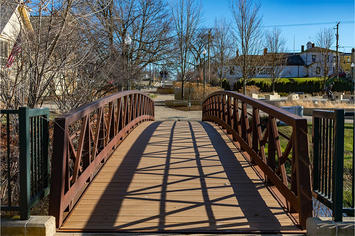
The mess in Washington underscores the harsh reality that our national fissures aren't going to be healed any time soon – if ever. Among other things, that means America will have to progress on the local and regional levels, where people actually live, whatever happens on the fractured plane of national identity and politics.
Call it a new localism.
America may remain an open wound in many ways, but there’s plenty happening that can build up and heal us in the towns, cities and states of Flyover Country and, for that matter, on the coasts. And there’s much more that we must do.
For one thing, the Covid lockdowns have been occurring on the state and local levels, and so also must the repair of our economies as, hopefully, the pandemic abates via vaccines, warmer weather, herd immunity and whatever other factors could help.
No grand pronouncements from the Oval Office or policy initiatives by Congress will fix the battered restaurants, gyms, movie-theater chains and other, mostly small, businesses that have suffered most from the shutdowns. The only way to restore them is for us as consumers, employees, and neighbors to do our part to help them survive, as we can.
Another tremendous possibility for a new localism in Flyover Country is for our cities, suburbs and even small towns to harness the ongoing technological dispersion of white-collar work – and to properly investigate the fact that many people in major coastal cities want to leave those places behind. Across the Heartland, we need to welcome them, confident that they’ll enjoy and want to participate in continuing to build up our way of life out here.
Consider Austin, Texas. The city is being flooded with promises from Silicon Valley tech firms to move their headquarters or significant operations to the capital of Texas, which has been a major node for the digital economy for decades already. Other outposts in Flyover Country should be encouraged by Austin’s success and take lessons from what that city is doing to create a flourishing tech ecosystem that lies about as far from either coast as you can get and still be in America.
Flyover Country also is going to continue to benefit from the strength our manufacturing sector has shown throughout Covid. We first demonstrated such resilience as manufacturers in the Heartland led the way in establishing health and safety protocols that enabled the great economic juggernaut known as the American factory to operate mostly unabated after the initial stage of the pandemic.
Manufacturing in our region will gain even more as companies intensify the decoupling of their supply chains from China. Experts out here in Flyover Country such as Vicki Holt, CEO of Protolabs, a digital-manufacturing company based in the Twin Cities, say this process is just beginning to acquire momentum.
“We’re in the very early innings of companies finding the right solutions for their individual product and supply chains to build that resiliency,” Holt told me. “The risks of long supply chains are political, and time and transportation costs as well as environmental impacts, as well as inability to respond to changes in demand. Companies are going to begin to put some changes in place.”
So it’s clear that the people, towns, cities, suburbs and states of Flyover Country, as well as the region as a whole, have a number of arrows in our quiver for 2021 and beyond. Yet the troubling fact remains that, while we have gained more national attention as a region because of our obvious political sway, it doesn’t necessarily translate into acceptance of the importance of the Heartland.
Read the rest of this piece at Flyover Coalition.
Dale Buss is founder and executive director of The Flyover Coalition, a not-for-profit organization aimed at helping revitalize and promote the economy, companies and people of the region between the Appalachians and Rockies, the Gulf Coast and the Great Lakes. He is a long-time author, journalist, and magazine and newspaper editor, and contributor to Chief Executive, Forbes, the Wall Street Journal, the New York Times and many other publications. Buss is a Wisconsin native who lives in Michigan and has also lived in Texas, Pennsylvania and Florida.












